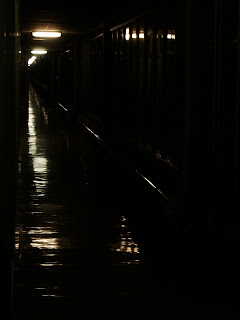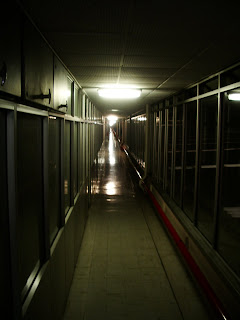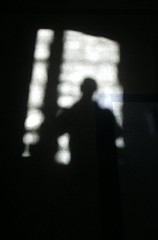File 1.93
Die Mutualisten
In der Evolution, das zeigt Robert Sussman (Harvard) sind aggressive Populationen wie die Meerkatzen oder die Paviane nur 1% ihrer Lebenszeit mit Raub oder Angriffen auf andere Tiere befaßt. 99% der gemessenen Zeit (in Betacam digital aufgezeichnet) verhalten sie sich "träge" oder "mutualistisch", d.h. sie lauschen auf Verständigung, sind kooperativ (um ihres Vorteils willen). Sussman hat gemessen: innerartliche and transartliche Kooperation, solche zwischen Laubbäumen und Pilzen, zwischen Haien und Pilotfischen usf. Hiervon zog er den Kollektivgeist großer Insektenstaaten (als Besonderheit) und Parasitismus ab [...] So kam er, seinen Zahlen nach, immer noch dazu, daß sich pure Egozentrik, wie sie die Evolution kennzeichnet, nicht in Aggression, sondern in Kooperationen äußert. Falls etwas im evolutionären Verlauf tückisch oder feindselig sein sollte, so sind dies die Koalitionen, nicht der offene Angriff.
The mutualists
In evolution, as shown by Robert Sussman (Harvard), aggressive populations such as meercats or baboons only spend 1% of their lifetime with predation or attack on other animals. 99% of their time measured (and digitally recorded) they behave as if "idle" or "mutualistic", that is, they listen out for cooperation, are cooperative (for their own advantage). Sussman has measured intraspecies and transspecies cooperation, such as between deciduous trees and fungi, between sharks and pilot fish etc. He excluded the collective spirit of large insect states (as an exception) and parasitism [...] Thus his figures still indicate that pure egocentrism, as designated by evolution, is expressed not in aggression, but rather in cooperation. If something in the course of evolution should prove deceitful or hostile, this would have to be the coalitions, not open attack.
A. Kluge,
Die Lücke, die der Teufel läßt, Suhrkamp, p. 749. Transl. mine.
Boil 2.04
[Michael] guessed the culprit was one of the new middle-class [soup kitchen] clients. "The fastest-growing group we have." Most had lost their apartments, scorched by the real-estate boom. "They're difficult to help, because they have no street smarts, and they're pissed off and demanding."
One man used to arrive at the soup kitchen in his Jaguar, his last valuable possession and the one he refused to part with. He claimed to have worked for the FBI and during the height of the terrorist frenzy talked himself into a job as a security analyst for CNN. "He lasted there three weeks." Fancying himself a restaurant critic, he would occasionally send back his plate with a note informing Michael of his displeasure. "He ended up selling books from the sidewalk on Broadway."
Michael Greenberg, Commentary - Freelance,
TLS, January 25 2008, p.16
Labels: TLS
Ostatni dzien lata
how the light
on the nature of 'experts'
linkTo the public, these men are members of a familiar fraternity, presented tens of thousands of times on television and radio as “military analysts” whose long service has equipped them to give authoritative and unfettered judgments about the most pressing issues of the post-Sept. 11 world.
Hidden behind that appearance of objectivity, though, is a Pentagon information apparatus that has used those analysts in a campaign to generate favorable news coverage of the administration’s wartime performance [...]
Most of the analysts have ties to military contractors vested in the very war policies they are asked to assess on air.
linkThe Guantánamo lawyers charged with devising interrogation techniques were inspired by the exploits of Jack Bauer in the American TV series 24.
The lawyers, all political appointees, who pushed through the interrogation techniques were Alberto Gonzales, David Addington and William Haynes. Also involved were Doug Feith, Rumsfeld's under-secretary for policy, and Jay Bybee and John Yoo, two assistant attorney generals.
linkProfessor Alan Dershowitz of Harvard Law School writes that "the simple cost-benefit analysis for employing such non-lethal torture [to extract time-sensitive information from a prisoner] seems overwhelming." Professor Jean Bethke Elshtain of the University of Chicago's School of Divinity acknowledges that torture remains a horror and is "in general [sic]...forbidden." But when interrogating "prisoners in the context of a deadly and dangerous war against enemies who know no limits...there are moments when this rule may be overridden."
Flure


adventures in deep time
[...] the greatest and longest work in Akkadian is the Epic of Gilgamesh, called in Akkadian, from its first line, sa naaba immuru, 'who saw the deep'. Most of its extant text comes from Ashurbanipal's library at Nineveh, but enough fragments remain from other sites and earlier periods to show that as an Akkadian epic the work dates from no later than the early second millenium. The Russian Assyriologist I.M. Diakonoff argues that, at least in an oral form, it must date from as early as c. 2200 B.C. It had wide circulation: a fragment was found in Palestine and fragments from Boghazhwi in Turkey show that it had been translated into Hittite and Hurrian. It was based on Sumerian traditions: behind the Akkadian Epic of Gilgamesh lie at least four separate Sumerian stories which some anonymous Akkadian-speaking poet...wove into a unified narrative.
source lost.
that time of year
April 14
biosphere 0.999b
Hierüber [Moral im Angesicht des eigenen Todes] sind besonders die Zeugnisse der Alten von Gewicht; weil sie nicht unter christlichem Einfluß stehn. Ich führe demnach an, daß wir diese Tatsache bereits ausgesprochen finden in einer dem uralten Gesetzgeber Zaleukos zugeschriebenen, nach Bentley und Heyne jedoch von einem Pythagoreer herrührenden Stelle, welche Stobaios (>Florilegium< 44, § 20) uns aufbehalten hat: (Oportet ante oculos sibi ponere punctum temporis illud, quo unicuique e vita excedendum est: omnes enim moribundos paenitentia corripit, e memoria eorum, quae iniuste egerint, ac vehementer optant, omnia sibi iuste peracta fuisse.) [Man muß jene Zeit vor Augen haben,in der jedem das Ende herannaht, wo er das Leben verlassen muß. Denn alle werden, wenn sie sterben sollen, von Reue ergriffen, sobald sie an das Unrecht denken, das sie begangen haben, und von dem Wunsche, in allen Fällen gerecht gehandelt zu haben.] [...] Durchgängig lehrt die Erfahrung, daß Sterbende sich vor dem Scheiden mit jedem zu versöhnen wünschen.
Schopenhauer,
Gesammelte Werke, Bd III, 799.
fata morgana
My plan was to go out to the southern Sahara to shoot a kind of science-fiction story about aliens from the planet Andromeda, a star outside of our own galaxy, who arrive on a very strange planet. It is not earth, rather some newly discovered place where the people live waiting for some imminent catastrophe, that of a collision with the sun in exactly sixteen years.
, (ed.) Paul Cronin, faber and faber, 2002, p. 47.





